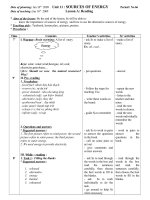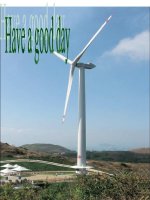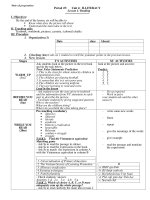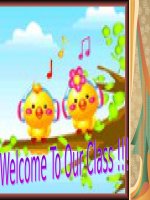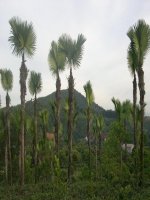unit 11 - A - READING
Bạn đang xem bản rút gọn của tài liệu. Xem và tải ngay bản đầy đủ của tài liệu tại đây (6.56 MB, 27 trang )
To Our Class
What do you see in
What do you see in
these pictures?
these pictures?
A whale is being killed
A tree is being cut down
A forest fire
I. Before You Read
I. Before You Read
A.
A.
Work in pairs to answer the following
Work in pairs to answer the following
questions:
questions:
1.
1.
Have you ever been to a national park?
Have you ever been to a national park?
2.
2.
Can you name some of the national
Can you name some of the national
parks in Vietnam and in the world?
parks in Vietnam and in the world?
3.
3.
What trees and animals can you see in a
What trees and animals can you see in a
national park?
national park?
TAM DAO
CUC PHUONG
PHU QUOC
BACH MA
BACH LONG VY
CAT TIEN
3. * Trees:
3. * Trees:
Pagoda-tree =Pipal (cây đa)
Pagoda-tree =Pipal (cây đa)
Bo-tree (cây bồ đề)
Bo-tree (cây bồ đề)
Red jasmin (cây
Red jasmin (cây
sứ)
sứ)
Pastel (cây tùng)
Pastel (cây tùng)
* Animals:
* Animals:
elephant
elephant
monkey
monkey
butterflies
butterflies
peacock
peacock
tiger
tiger
crocodile
crocodile
EVERGLADES
NAIROBI
CUC PHUONG
I. Before You Read
B. Vocabulary
- Orphan (n) :
- Orphan (n) :
tr m côi, thú m côiẻ ồ ồ
tr m côi, thú m côiẻ ồ ồ
Orphan (v) :
Orphan (v) :
(khi n cho) m côiế ồ
(khi n cho) m côiế ồ
ORPHANAGE
Abandon (v): từ bỏ, bỏ rơi
WILDERNESS
TROPICAL
TEMPERATE
FRIGID
TOXIC
= Poisonous
I. Before You Read
-
Orphan (n) /
Orphan (n) /
' :fn/: ɔ
' :fn/: ɔ
Orphan (v)
Orphan (v)
Orphanage (n) /' :f nidɔ ə ʒ
Orphanage (n) /' :f nidɔ ə ʒ
/
/
- Abandon (v) /
- Abandon (v) /
'bə
'bə
ænd
ænd
n/:ə
n/:ə
- Wilderness (n) /
- Wilderness (n) /
'
'
wild
wild
nis/:ə
nis/:ə
- Temperate (adj) /
- Temperate (adj) /
'temp r t/:ə ə
'temp r t/:ə ə
-
-
Toxic (adj) /
Toxic (adj) /
't ksik/:ɔ
't ksik/:ɔ
tr / thú m côiẻ ồ
tr / thú m côiẻ ồ
(khi n cho) m côiế ồ
(khi n cho) m côiế ồ
tr i m côi ạ ồ
tr i m côi ạ ồ
t bừ ỏ
t bừ ỏ
vùng hoang dã
vùng hoang dã
(có khí h u) ôn hòaậ
(có khí h u) ôn hòaậ
đ cộ
đ cộ
B. Vocabulary
VOCABULARY
VOCABULARY
national park (n)
national park (n)
['næ∫n l'p :kə ɑ
['næ∫n l'p :kə ɑ
]
]
:
:
v n quô c già ́ươ
v n quô c già ́ươ
to establish
to establish
[is'tæbli∫]
[is'tæbli∫]
: thi t l pế ậ
: thi t l pế ậ
to contain
to contain
[k n'tein]ə
[k n'tein]ə
:
:
chứa đựng, bao gồm
chứa đựng, bao gồm
rainforest (n)
rainforest (n)
['rein'f rist]ɔ
['rein'f rist]ɔ
: r ng nhi t đ iừ ệ ớ
: r ng nhi t đ iừ ệ ớ
to hike mountain
to hike mountain
[haik
[haik
'mauntin
'mauntin
]
]
: leo núi
: leo núi
dry season (n)
dry season (n)
[drai
[drai
'si:zn]
'si:zn]
: mùa khô
: mùa khô
→
→
rainy season
rainy season
to be over (exp.)
to be over (exp.)
: h t, đã quaế
: h t, đã quaế
to learn how to do sth (exp.)
to learn how to do sth (exp.)
: bi t cách làm gìế
: bi t cách làm gìế
to recognize
to recognize
['rek gnaiz]ə
['rek gnaiz]ə
: nh n raậ
: nh n raậ
habit (n)
habit (n)
['hæbit]
['hæbit]
: thói quen
: thói quen
to depend (upon / on)
to depend (upon / on)
[di'pend]
[di'pend]
: l thu c vàoệ ộ
: l thu c vàoệ ộ
survival (n)
survival (n)
[s 'vaivl]ə
[s 'vaivl]ə
: s s ng sót ự ố
: s s ng sót ự ố
→
→
to survive
to survive
:
:
to orphan
to orphan
[' :f n]ɔ ə
[' :f n]ɔ ə
: làm cho tr em m côi cha mẻ ồ ẹ
: làm cho tr em m côi cha mẻ ồ ẹ
orphaned animal
orphaned animal
: thú không cha m / b b r iẹ ị ỏ ơ
: thú không cha m / b b r iẹ ị ỏ ơ
abandon (v)
abandon (v)
[ 'bænd n]ə ə
[ 'bænd n]ə ə
: b r iỏ ơ
: b r iỏ ơ
to take care of
to take care of
(exp.)
(exp.)
: ……………….
: ……………….
sub-tropical (a)
sub-tropical (a)
[s bʌ
[s bʌ
'tr pikl]ɔ
'tr pikl]ɔ
: bán nhi t đ i ệ ớ
: bán nhi t đ i ệ ớ
→
→
tropical
tropical
wilderness (n)
wilderness (n)
['waildnis]
['waildnis]
: vùng b hoangỏ
: vùng b hoangỏ
southeastern adj.)
southeastern adj.)
[sauθ
[sauθ
'i:st n]ə
'i:st n]ə
: thu c Đông Nam ộ
: thu c Đông Nam ộ
temperate zone (n)
temperate zone (n)
['temp r tə ə
['temp r tə ə
zoun]
zoun]
: vùng ôn đ i ớ
: vùng ôn đ i ớ
nearby (adj.)
nearby (adj.)
['ni bai]ə
['ni bai]ə
: lân c nậ
: lân c nậ
toxic (a)
toxic (a)
['t ksik]ɔ
['t ksik]ɔ
: đ c h iộ ạ
: đ c h iộ ạ
contamination (n)
contamination (n)
[k n,tæmi'nei∫n]ə
[k n,tæmi'nei∫n]ə
: s ô nhi m ự ễ
: s ô nhi m ự ễ
→
→
to contaminate
to contaminate
[k n'tæmineit]ə
[k n'tæmineit]ə
= to pollute
= to pollute
[p 'lu:t]ə
[p 'lu:t]ə
:
:
contaminated (a) = polluted (a)
contaminated (a) = polluted (a)
: ô nhi mễ
: ô nhi mễ
intend to do sth (exp.)
intend to do sth (exp.)
[in'tend]
[in'tend]
: d đ nh làm gìự ị
: d đ nh làm gìự ị
exist (v)
exist (v)
[ig'zist]
[ig'zist]
: t n t iồ ạ
: t n t iồ ạ
area (n)
area (n)
['e ri ]ə ə
['e ri ]ə ə
: di n tíchệ
: di n tíchệ
Cuc Phuong National Park, Vietnam
Cuc Phuong National Park, Vietnam
Cuc Phuong National Park is located 160
Cuc Phuong National Park is located 160
kilometres south west of Hanoi. It is the first
kilometres south west of Hanoi. It is the first
of Vietnam’s nine national parks to be
of Vietnam’s nine national parks to be
established (1962), and it
established (1962), and it
contains
contains
over 200
over 200
square kilometres of rainforest. Tourists go
square kilometres of rainforest. Tourists go
there to study butterflies, visit caves, hike
there to study butterflies, visit caves, hike
mountains and look at the 1,000-year-old tree.
mountains and look at the 1,000-year-old tree.
The best time to visit the park is during the
The best time to visit the park is during the
dry season, from October to April, when the
dry season, from October to April, when the
rainy season is over.
rainy season is over.
Cuc Phuong
National Park
One thousand year-old tree
BAMBOO TREEBUTTERFLYMONKEY
Turtle
Panda
Snake
Dolphin
Zebra
Lion
Elephant
Bird
Rabbit
Butterfly Horse
Kangaroo
Nairobi National Park, Kenya
Nairobi National Park, Kenya
Nairobi national Park is Kenya’s smallest park,
Nairobi national Park is Kenya’s smallest park,
but you may be surprised at the large variety of
but you may be surprised at the large variety of
animals that live there. Visitors. Especially
animals that live there. Visitors. Especially
children, can go there to learn how to recognize
children, can go there to learn how to recognize
the different
the different
species
species
of animals and plants.
of animals and plants.
They also learn about the habits of animals and
They also learn about the habits of animals and
how one species is dependent upon another for
how one species is dependent upon another for
survival
survival
. An interesting feature of this park is
. An interesting feature of this park is
the Orphanage, where lots of orphaned or
the Orphanage, where lots of orphaned or
abandoned animals are taken care of.
abandoned animals are taken care of.
Nairobi National Park, Kenya
Nairobi National Park, Kenya
Everglades National park, USA
Everglades National park, USA
Everglades National Park, is a
Everglades National Park, is a
sub-tropical
sub-tropical
wildness in the southeastern United States. This
wildness in the southeastern United States. This
national park is special because it has plants
national park is special because it has plants
and animals from both tropical and temperate
and animals from both tropical and temperate
zones. Due to an increase in population and the
zones. Due to an increase in population and the
use of nearby land for farming, there are toxic
use of nearby land for farming, there are toxic
levels of chemicals in the water. This
levels of chemicals in the water. This
contamination
contamination
has threatened the park and
has threatened the park and
many of the animals in it.
many of the animals in it.
Everglades National Park, USA
Everglades National Park, USA
While you read:
While you read:
establish
establish
2. …………. : to have something inside.
2. …………. : to have something inside.
3. …………. : a group/ groups of animals or
3. …………. : a group/ groups of animals or
plants
plants
4. …………. : a state of continuing to live or exist
4. …………. : a state of continuing to live or exist
5. …………. : related to an area near a tropical
5. …………. : related to an area near a tropical
area
area
6. …………….: a state of being polluted.
6. …………….: a state of being polluted.
species
survival
survival
sub-tropical
sub-tropical
contamination
contamination
contain
contain
Task 1
Task 1
:
:
Find the word in the passage that best
Find the word in the passage that best
suits each of the following definitions
suits each of the following definitions
1. ………….
1. ………….
:
:
to start an organization that is
to start an organization that is
intended to continue for a long time.
intended to continue for a long time.
Task 2
Task 2
:
:
Answer the following questions
Answer the following questions
1. What is the area of the rainforest in Cuc
1. What is the area of the rainforest in Cuc
Phuong National Park?
Phuong National Park?
1. It is over 200 square kilometers.
2. Because the rainy season is over.
2. Why would November be a
2. Why would November be a suitable
time
time
to visit this park?
to visit this park?
3. What can people learn in Nairobi National
3. What can people learn in Nairobi National
Park?
Park?
3. They can learn about the habits of animals
and how one species is dependent upon
another for survival
4. What kinds of animal are taken care of in
4. What kinds of animal are taken care of in
the Orphanage?
the Orphanage?
4. In the Orphanage, orphaned (abandoned)
animals are taken care of.
5. Everglades National Park is endangered
because of the toxic levels of chemicals in
the water.
6. If more chemicals are released into water
plants and animals will die/ be killed/
destroyed.
5. Why is Everglades National Park
5. Why is Everglades National Park
endangered?
endangered?
6. What do you think will happen to
6. What do you think will happen to
Everglades National Park if more chemicals
Everglades National Park if more chemicals
are released into water?
are released into water?
AFTER YOU READ:
AFTER YOU READ:
1. Why do you like to visit Cuc Phuong
1. Why do you like to visit Cuc Phuong
National Park?
National Park?
2. Why do you like to visit Nairobi National
2. Why do you like to visit Nairobi National
Park?
Park?
3. Why do you like to visit Everglades
3. Why do you like to visit Everglades
National Park?
National Park?
1. Because I can look at the 1,000-year-old
tree.
- or Because I can study butterflies.
- or Because I can visit caves.
2. Because I can learn how to recognise the
different species of animals and plants.
3. Because it has plants and animals from
both tropical and temperate zones.
